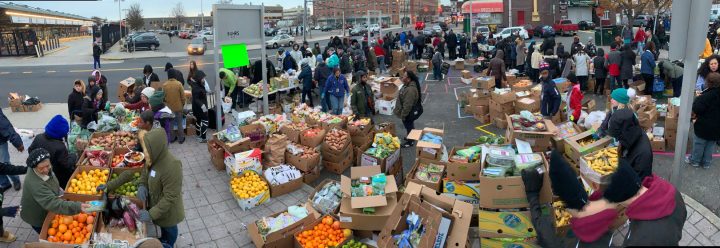By j.jill
As Thanksgiving week hammers its start-of-the-season advertising from restorative nostalgia around family tables—turkey, gravy and mashed potatoes— to Black Friday ads that repeat the same jingle every two minutes, it’s time to turn it all off and just stop to think.
Storybook versions of different people feasting together to welcome and celebrate cooperation have their limits when we explore history realistically. And these days are no exception. Still, a twinge of angst rises for many during Thanksgiving week and seems to extend through January 1st. So, what may be some realistic ways to assess and recognize the emotional flurry that takes place and how to deal with it? One group on Long Island seems to have discovered an answer.
Community Solidarity is a Long Island relief organization that rescues a small amount of the 27 million pounds of food wasted daily from local markets and grocery stores to feed tens of thousands of people each week. Its all-vegetarian food shares proclaim something we all should consider, “Food is a right, not a privilege.” Its volunteers recoup a part of the 51% of daily wasted, perfectly good food from collaborating grocery stores and set up weekly food shares in communities throughout the year, four on Long Island, one in Brooklyn. Volunteers drive, collect, set-up, and give a week’s worth of groceries to those who otherwise would struggle with food insecurity. In places like Hempstead, Wyandanch, Farmingville, Huntington Station and Bedford-Stuyvesant, considered by many as “food deserts”, where less access to healthy, nutritious food options is available to local residents, Community Solidarity sets up one day a week during the year, whatever the weather, and offers vegetables, fruits, baked goods and even prepared meals for those who may otherwise have little or nothing to eat. In recent years, food insecurity has become an issue in a variety of situations, including for the economically vulnerable, children, elderly, disabled, those in disproportionately low-income neighborhoods with fewer resources and it may be a temporary or more permanent condition. In fact, according to the USFDA:
In the United States, food waste is estimated at between 30–40 percent of the food supply. This figure, based on estimates from USDA’s Economic Research Service of 31 percent food loss at the retail and consumer levels, corresponded to approximately 133 billion pounds and $161 billion worth of food in 2010. Wasted food is the single largest category of material placed in municipal landfills and represents nourishment that could have helped feed families in need.[1]
While…globally, one third of all food produced, worth nearly $1 trillion, is wasted every year, according to the United Nations Food and Agriculture Organization (FAO).[2]
These long-term plans and projects from government bureaus offer hope and vision. But it seems evident that Community Solidarity has a “hands-on” immediate solution for a critical, pressing problem that can be found in almost every community locally, regionally, nationally and in a conceivable way, globally. It would take “people-power” and enough of it consistently to uphold the pace it takes to fulfill this mandate five out of seven days each week. That need for can be found in administrations re-directing portions of adolescent and young adult classroom education to include service for credit, apprenticeship and partnering with existing businesses and organizations dedicated to problem-solving and applied learning.
The potential beauty of this season may revitalize fond memories, bring a longing for dreams of an unimagined life or help cope with struggles, temporary or otherwise. Whatever these final months of 2019 may mean, an increasing need calls us to work, serve, and uplift together with reflection, empathy, compassion and action. For more information, contact Community Solidarity at https://communitysolidarity.org/
[1] https://www.fda.gov/food/consumers/food-waste-and-loss
[2] https://ec.europa.eu/food/safety/food_waste/eu_actions/food-waste-measurement_en
Making connections through experience has been the foundation of j.jill’s personal philosophy: in education, service, writing, spirituality and the arts. She teaches Italian part-time within the State University of NY system, follows topics in peace & justice advocacy, and enjoys spending time with friends & family including two very affectionate rescue puppies.










